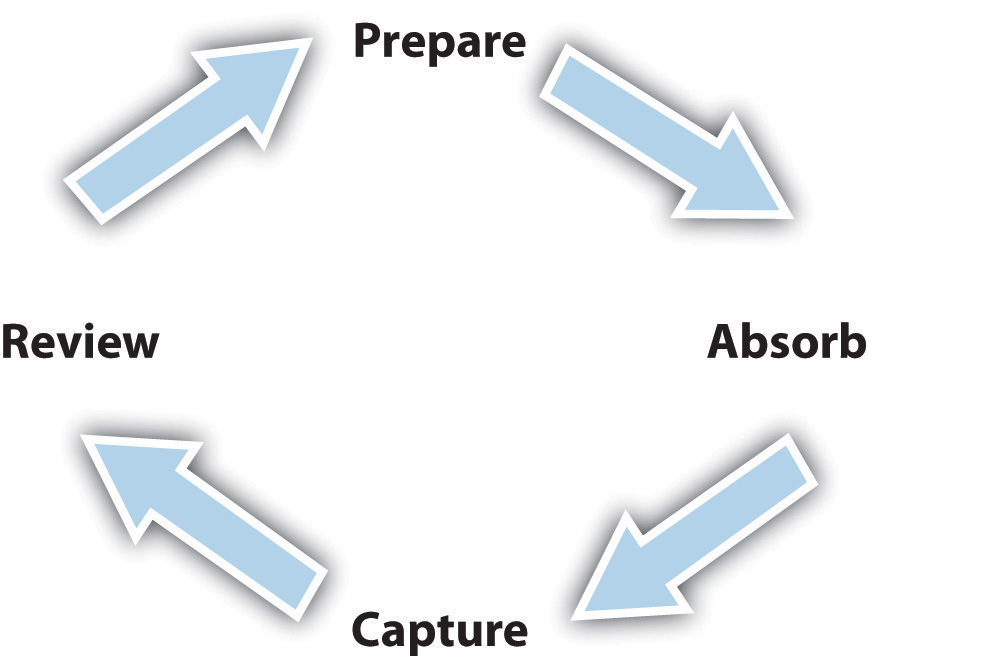6.1 The Learning Cycle
As previously mentioned the focus will be on adult learning. This concept is a rich experience, given that an organization can have a diverse range of adults learning at any time. Diversity is seen with age, gender, experience, and education level. Adults in college have a level of freedom to pursue their academics on their own terms, which leads to a host of different learning styles present in adults. Theoretically, adults engage in academic learning in a four step cycle[1]:
- Prepare
- Absorb
- Capture
- Review

Prepare
The concept of preparation relates to the student’s readiness. Within an institution or organization, preparation is the individual’s readiness to pursue knowledge within a class, semester, or program. Stewart and Maisonville describe preparing as the ability to put yourself in the right mind-set to learn[1]; which places the emphasis on mental preparedness. Within learning organizations, preparedness also involves some knowledgeable aspects for success. Good leaders and good managers are often defined by their extent of expert knowledge within a field. Therefore, those who have the knowledge available will become better prepared for work.
Absorb
What comes to mind often is the simile of the sponge. When absorbing knowledge, the student is the sponge and the water is the knowledge getting absorbed. Keep in mind that the sponge has the ability not to only absorb water, but to absorb a host of liquids (coffee, soup etc.) as well. This relates to the notion that absorption for a student is the taking in of new and different ideas within a classroom or in the reading of a textbook[1]. Absorption in the case of a leader or manager within a learning organization can come from agents of accountability (i.e. upper managers) or agents of dependency (i.e. subordinates). The ability to accept new knowledge is a key factor to being a successful leader and manager within a learning organization.
Capture
When absorbing material, sometimes it does not stay in the sponge and leaks out. This is where capturing comes in, and relates to the re-interpretation of knowledge for better understanding and contextualization. For leaders and managers within learning organizations, consistent review and process is done on a daily basis. Past measurements, performance, and forecasts provide a map to the re-capturing of new data for better understanding in future endeavors.
Review
Going over all of the information from absorption to capturing is important to fully grasp a concept and to gain full understanding. Once this is done, the student should be able to identify, describe and contextualize a piece of knowledge. This is referred to as reviewing. Using the cycle, Stewart and Maisonville also use the review process as a way to prepare for new information and ideas[1]. This is also relevant for leaders and managers within learning organizations as review depends on capturing knowledge, and capturing new knowledge depends on reviewing. For example, organizational forecasting cannot be achieved without a review of the organization’s past, and with no understanding of the past, a leader or manager would not be able to effectively forecast. Consistent revision is imperative to the success of a student or someone working in a learning organization.
How Memory Works
The concept of learning is closely tied to memory and retention of relevant learning materials. Memory works in two ways: short-term memory and long-term memory. Memory in the short term is the active approach to memorization, and focuses on learning in the moment. Memory in the long term is the passive approach through a series of data links which are retained in our minds at all times[1]. Learning can vary by individual, but the concept of fostering deep learning and long-term retention is beneficial to a student, teacher, or administrator in a learning organization.
Key Concepts with Adult Learners
Adult learning theory show us how adults learn differently than children. Using the same approach on adults that was used on children will not be effective. Here are some things to keep in mind when preparing to teach adult learners [20]:
Adults must see value in what they are learning.
Adults must use the knowledge that they gain in the short term or they will not retain the knowledge.
Adults need the topic to be relevant to them.
If adults do not use what they have learned in the short term, and the topic is not of interest to them, they will not retain much of what was taught.
Adults will use past experience to evaluate and consider what is being taught to them. Prior experience will impact if they learn the topic.
Adults are self directed learners and need to be allowed to determine how they learn.
Review Questions:
- What are the four steps to academic learning?
- What is the difference between long-term and short-term memory?
An active approach to learning in the moment
A passive approach through a series of data links retained in our minds

